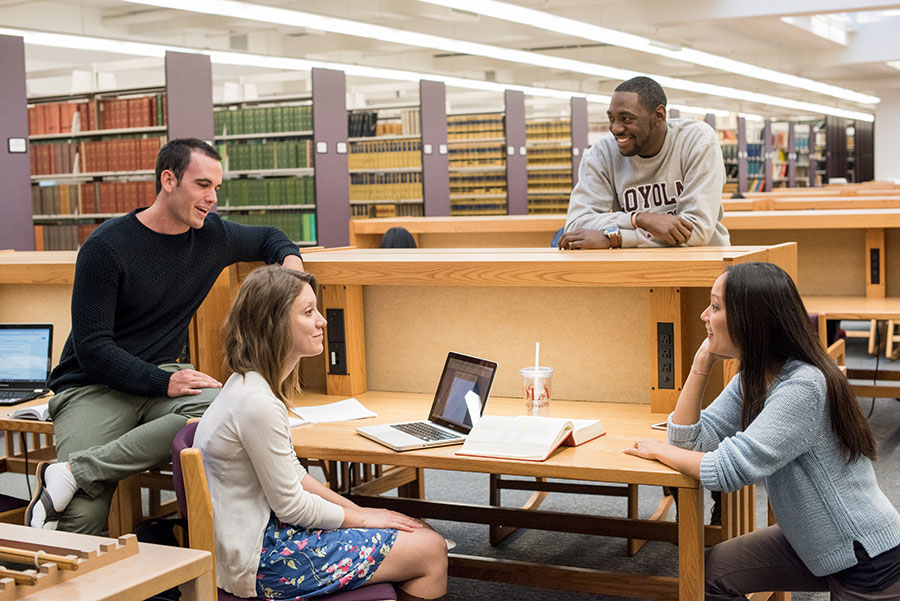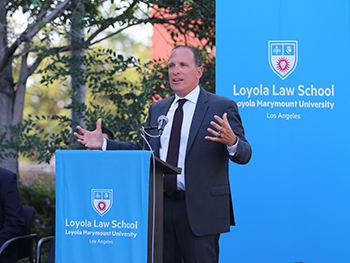
When students embark on their years of study at LMU Loyola Law School (LLS), they quickly become accustomed to two core locations on campus, two spaces of solidarity and community. First stop is the Rains Law Library, where students source the legal materials they need to create the most compelling arguments. Next is Founders Hall, where the Loyola Social Justice Law Clinic is based. Consisting of more than 20 specialist clinics equipped to advocate for social justice – ranging from immigration rights and juvenile justice, to landlord-tenant disputes and taxation issues – the Loyola Social Justice Law Clinic is a practicing law firm fully integrated as part of the university. This is where students fulfill the pro bono service requirement that provides them with unparalleled practical experience before graduating, and where they learn how their own ambitions can serve the greater good.
For decades, students have steadily made their way between these two locations on campus, combining the knowledge gathered from books with the unforgettable understanding gained from representing clients in need – whether securing legal status for an undocumented minor facing abuse, proving the innocence of a wrongly incarcerated individual, or reducing the sentence of young person facing a lifetime in prison. For the lawyer and philanthropist Joan Lavine, this approach to education became the inspiration for a tremendous legacy: a $10 million bequest to support the library and social justice initiatives at LLS.

“This gift will help transform many aspects of our work,” said Waterstone. “It will fuel the continued success of our clinics, where our students are working on life-changing cases for the most vulnerable members of our community. It will strengthen our law library and scholarly mission, allowing us to grow the impact of our services and work. As these investments allow us to continue living out our ambition, they will inspire others to do the same.”
The gift to the library honors the cherished friendship between Lavine and former LLS head librarian, Dan Martin, who enjoyed many long conversations when they were neighbors in Malibu. Together, the lawyer and the librarian discovered a meeting of minds, and they found common ground in the mission of Loyola Law School. Lavine was deeply moved by the possibility of aligning legal practice with the commitment to protect marginalized members of society, and she was also aware of the steep learning curve between an academic environment and professional practice. She recognized that the Loyola Social Justice Law Clinic offered a rare opportunity for students to engage directly with the high stakes of real cases.
For the lawyer and philanthropist Joan Lavine, this approach to education became the inspiration for a tremendous legacy: a $10 million bequest to support the library and social justice initiatives at LLS.
“We are grateful for the support of our Loyola Social Justice Law Clinic, which enables us to engage 150 law students per semester in providing more than 30,000 hours of legal services to expand access to justice,” said Elizabeth Bluestein, executive director of the Loyola Social Justice Law Clinic. “Just this past year, students in our clinics helped 30 youth achieve stronger futures by graduating from high school, successfully exiting the juvenile justice system without permanent records, and obtaining supportive services they need to thrive. Our students also helped 28 clients come home from wrongful incarceration, 130 clients overcome the collateral consequences of convictions, and 150 immigrants overcome barriers to becoming U.S. citizens. Bequests like this one provide sustainability for these programs, and enable us to make longer term commitments to the communities we serve.”
LLS was the first ABA-accredited school in California to institute a pro bono service requirement, and those experiences with clients have shaped the values and careers of countless students. It’s an approach to learning that reveals a phenomenon at the heart of Jesuit education: once students experience a taste of doing good, they discover a new source of energy that serves them for life. Lavine’s bequest was her very personal way of becoming part of the LLS story – a way of sharing in the hope and the dynamism that has allowed so many LLS students to thrive, and will continue to do so for generations to come.
To learn more about leaving a bequest to LMU, contact Sara Whelan ’03, J.D., administrative associate for gift planning, at 310.338.1862, sara.whelan@lmu.edu. You may also wish to visit the LMU gift planning giving website, and you can give to the Loyola Social Justice Law Clinic here.



